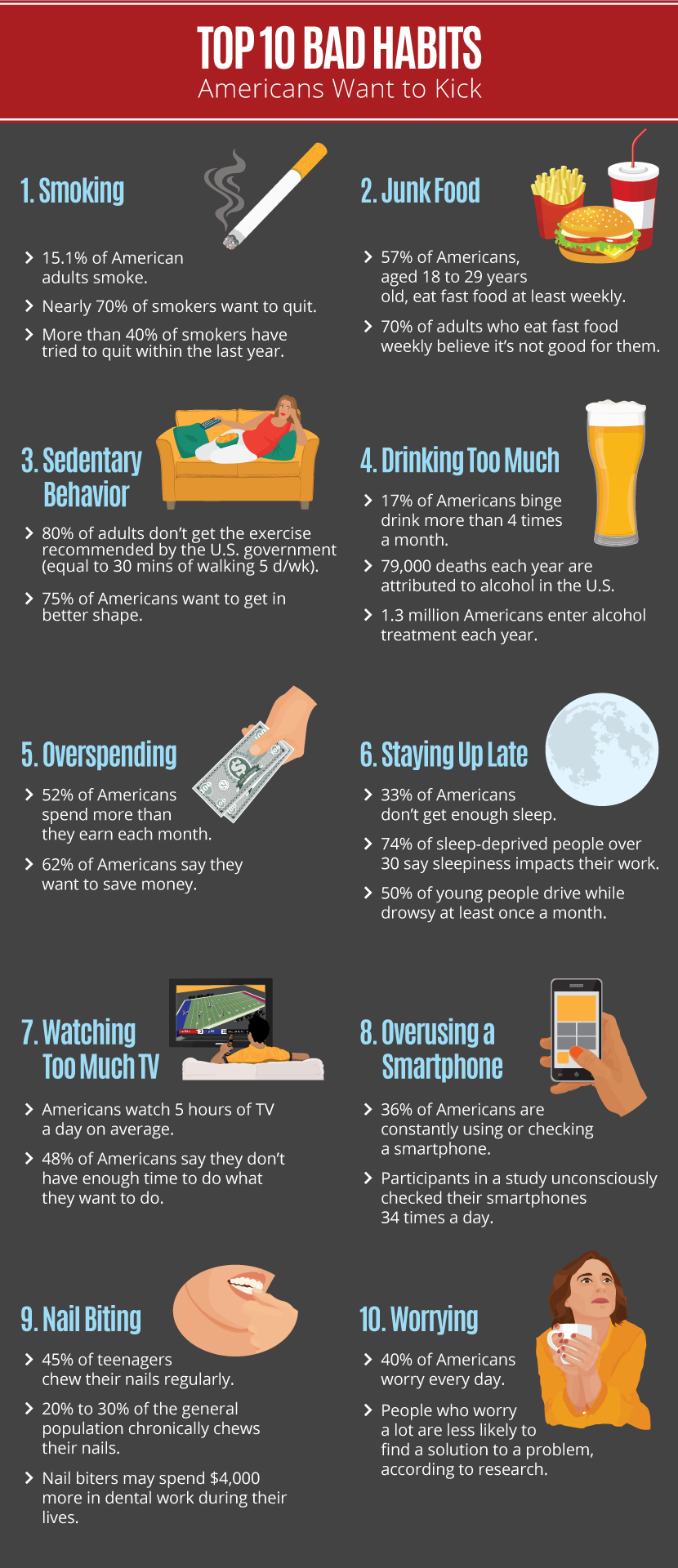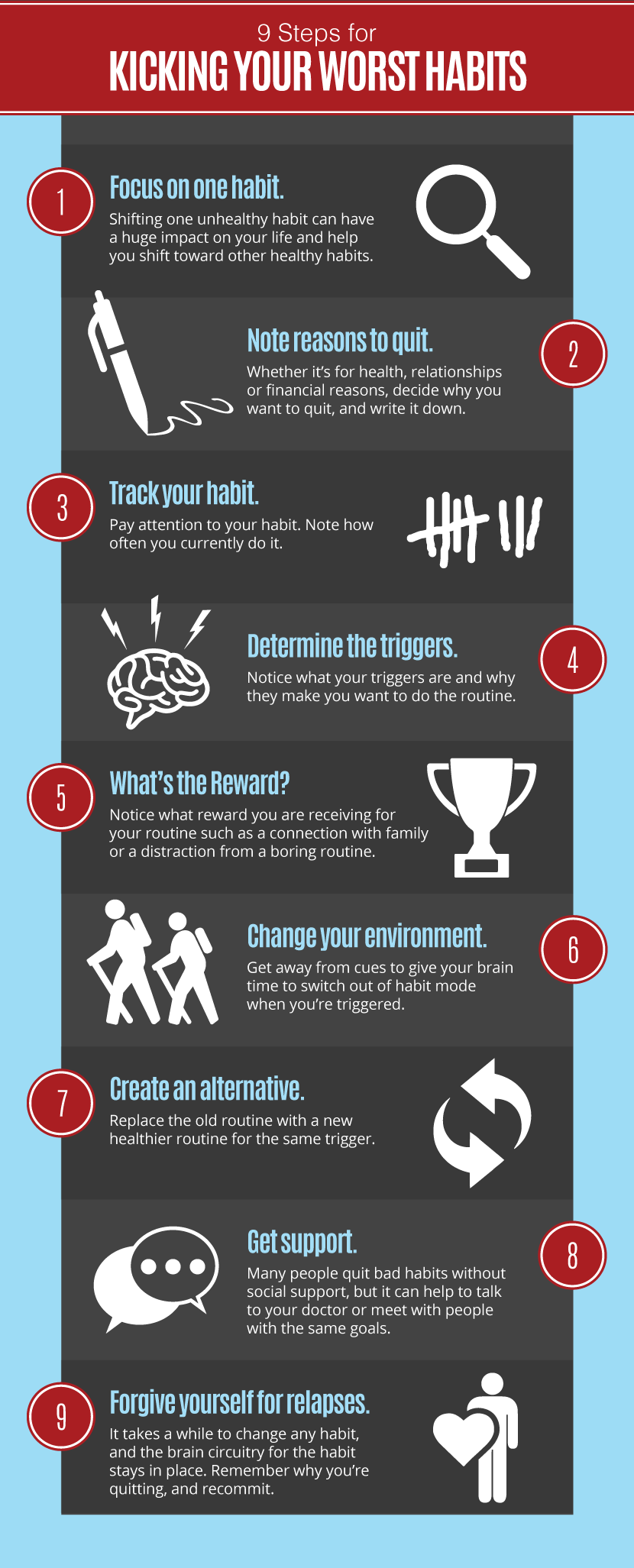
Get your fix of expert articles delivered straight to your inbox!
No Thanks - I don't like cool stuff

Bad habits are easy to pick up, and much harder to break. Do you desperately want to quit smoking, biting your nails, binge drinking, or constantly checking your smart phone? Do you long to cut fast food, reality television, or incessant worry out of your life? You’re not alone. Bad habits can take a huge toll on our lives. According to a report by the Institute for Health Metrics and Evaluation at the University of Washington, bad habits, particularly smoking, poor eating habits, and sedentary living, are the leading cause of premature death worldwide.http://www.nbcnews.com/health/health-news/whats-killing-us-its-mostly-our-own-bad-habits-n425321
When you have a bad habit, it can feel like you’ve lost control of your actions. But your habits are not your destiny. They’re a function of your efficient brain, and you have the power to change them. Keep reading to learn how you form habits and what happens in your brain when you’re acting habitually. Once you understand, it’s easier to gain the upper hand and say goodbye to your worst habit once and for all.

Approximately 40 to 45 percent of your actions are habits, according to Charles Duhigg, author of The Power of Habit: Why We Do What We Do in Life and Business.https://hbr.org/2012/06/habits-why-we-do-what-we-do That means you don’t consciously initiate or plan out nearly half of what you do every day. Unfortunately, some unconscious actions are not healthy. You may find yourself in the kitchen with a cookie in your hand or notice you’ve lit a cigarette when you started your car.
But you wouldn’t want to abandon habits altogether. Habits are a function of your efficient brain, which recognizes and assigns routine tasks to the basal ganglia, a deep part of the brain that unconsciously performs motor actions while you consciously do other complex tasks. Without habits, you wouldn’t be able to walk, talk, type, or read this article because you’d need to plan out how to put your foot on the ground or move your finger.http://www.npr.org/sections/13.7/2010/09/22/130051236/the-habitual-brain
Habits consist of three parts: a cue, a routine, and a reward. When you repeat the same cue, routine, and reward enough times, the brain recognizes it as a routine pattern and moves it to the basal ganglia. Research suggests it takes an average of 66 days to create a habit, and the time period can range from 18 to 254 days.http://www.sciencealert.com/here-s-how-long-it-takes-to-break-a-habit-according-to-science
Good habits make sense since they keep us alive and healthy. But why would someone form an unhealthy or harmful habit? Research from Johns Hopkins University sheds some light on this question. In the study, subjects were awarded money for finding red shapes generated by a computer program. The next day they were told to find shapes of a different color. But the subjects continued to unconsciously find more red shapes. And each time they found a red shape, their brains released a burst of dopamine, a feel-good chemical.https://hub.jhu.edu/2016/02/11/dopamine-addiction-brain-science/ Notably, some subjects’ brains released more dopamine than others. This experiment helps explain why some people reach for unhealthy food or substances when they receive no external reward or even get sick or feel bad afterward.

Remember this: You have conscious control over your habits. Thousands of people quit smoking, drinking, and using addictive substances even with no therapy or treatment.https://www.psychologytoday.com/articles/200405/the-surprising-truth-about-addiction-0 Though the basal ganglia controls habits, a small part of the pre-frontal cortex remains active in switching on and off certain habits, according to research conducted at the Massachusetts Institute of Technology.http://news.mit.edu/2012/understanding-how-brains-control-our-habits-1029 That means you have the conscious power to stop doing an action if you want to. However, it may be challenging.
If you have many bad habits you’d like to lose, choose just one to start with. Having a strong reason to quit can make it easier to get through the transition process. Brainstorm and write down why you want to quit it, whether it’s to be a good role model for your kids or improve your scores on a medical test.
Then get curious about your habit. Pay close attention to the cues, routine, and rewards involved. Several apps are available to help people track habits, or you can use a pen and paper. What need is your habit filling for you? Does it distract you from boredom, help you relax, or make it easier to socialize?
Once you’ve dissected your habit, decide how to quit. Depending on the habit, it may be better to quit it all at once – a method sometimes called “cold turkey” – cut back on your intake, or taper down with the goal of stopping. Research indicates people who quit smoking by going cold turkey have more success than those who taper down.http://www.latimes.com/science/sciencenow/la-sci-sn-to-quit-smoking-total-abstinence-20160314-story.html However, tapering down is often the best course of action for quitting other addictive substances that cause severe withdrawal symptoms, such as caffeine, alcohol (when used heavily), or narcotics.http://hams.cc/taper/ For addictions involving junk food, moderate drinking, or social media, it may make sense to reduce your intake since these can be safely enjoyed in moderation.
Once you understand the cue, routine, and reward pattern, experiment with replacing your unwanted routine with a better routine. If you come home from work on Friday and reward yourself with a few too many alcoholic beverages, determine what need you’re filling by drinking. Is it relaxing? Try rewarding yourself with a movie or a bath instead. Does it make it easier to socialize? Try hanging out with a friend who doesn’t drink. Does it distract you from a stressful home environment? Try going for a walk. Pay attention and experiment with routines until you find a healthier routine that fills the same need.
At the same time, change your environment to remove cues and make it harder to fall back into your old habit. In the example above, you’d likely want to remove alcohol from your home, steer clear of your drinking buddies for a while, and avoid bars or restaurants where you liked to drink. Social support may be helpful. There are many formal support groups and anonymous online support boards. If you’re quitting an addictive substance, consider talking to your doctor about medications and methods that can help.
Don’t expect to replace your old habit with a healthier habit overnight. Remember, it takes an average of 66 days to form a new habit, and relapses happen, especially during times of stress. The brain circuitry for your old habit remains in place, so it’s easier to restart your old routine than to establish a new one. If you return to your bad habit, forgive yourself and start again.

Habits aren’t all bad. Eating well, exercising, and flossing are all habits too. Now that you understand why and how the brain develops habits, it will be easier to set up healthy habits for yourself. Want to exercise every morning? Create a cue, such as laying out your workout clothes and your dog’s leash the night before. Eventually, when you see your clothes and the leash, you’ll automatically get dressed and head out for a walk.
And here’s some great news: Creating just one positive habit may lead to many more. Duhigg calls certain habits, such as exercising and making your bed in the morning, “keystone habits” because they encourage people to adopt other good habits, such as eating more healthily, budgeting, and being more productive at work.https://www.businessinsider.com/keystone-habits-that-transform-your-life-2015-8 Your habits don’t control you, and you can even put them to work to build yourself a happier life.
Written by:

Get your fix of expert articles delivered straight to your inbox!
No Thanks - I don't like cool stuff